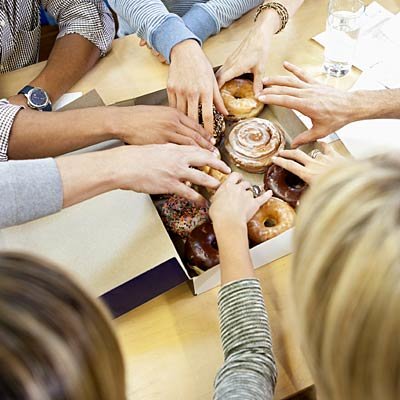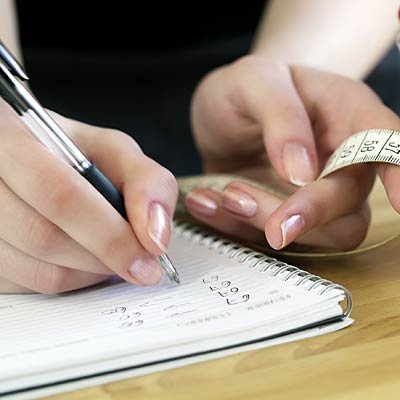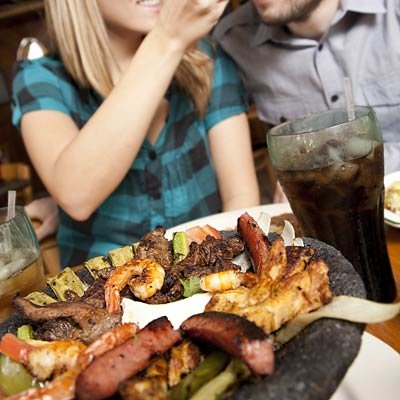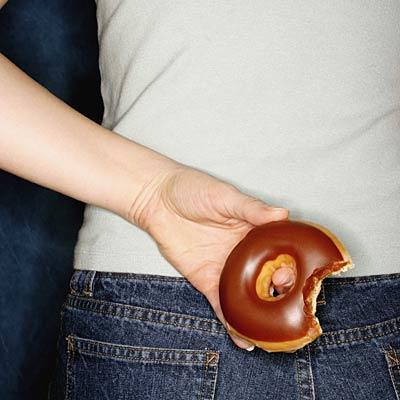1 of 12

If you're impulsive…
In a famous 1972 study, scientists offered young children a choice between a single marshmallow immediately or, if they could wait 15 minutes, two marshmallows. Those who waited went onto experience more success and higher SAT scores later on in life. The ability to delay gratification also relates to weight loss, says Art Markman, PhD, professor of psychology at the University of Texas. "People tend to be either a 'one-marshmallow person' or a 'two-marshmallow person.'" If you're struggling with weight loss, you are more likely a one-marshmallow person. Eliminating little temptations will help: stop stocking your pantry with junk food, and avoid the break room at work when you know there will be leftover treats. Related: How to Cheat-Proof Your Diet
2 of 12
3 of 12

If you're reliable…
Always on time? Follow rules by the book? It means you're conscientious, a trait that makes it easier to stick with an eating or fitness plan, says Markman. However, whether you're conscientious or not, there's a paradox in that creating a plan forces you to think about food all the time, which can work against you. The solution: create routines not specifically about dropping pounds that will still lead to weight loss, he suggests. For example, instead of driving your kids the mile to school, start walking with them.
3 of 12
4 of 12

If you're prone to mood swings…
The way you ride life's rollercoaster determines your emotional stability. "If you're emotionally excitable, things are either very good or the worst ever," says Markman. Some people are emotional eaters, so the more you're on the emotional rollercoaster the more likely you are to reach for food. "The more excited you are in general, the more likely you are to take action, and eating is an action," says Markman. Learn to recognize your own ups and downs and try to take action in healthier ways, like calling a friend or sweating your stress away with a workout.
4 of 12
5 of 12

If you're quiet…
People who prefer curling up with a book over a night out at the bar may have a leg up on weight loss. "Introverts may have a more thoughtful, less impulsive style that enables them to consider their choices more rationally," says Heidi Hanna, PhD, performance coach and author of The Sharp Solution: A Brain-Based Approach for Optimal Performance. Introverts are more likely to possess qualities that enable them to commit to a healthy diet and regular exercise routine, both of which require restraint, difficult for more impulsive people, she says. Extroverts should plan ahead for situations that test willpower. If you know you're headed to a party, for instance, eat a healthy snack beforehand so you'll be less likely to scarf down junk.
5 of 12
6 of 12

If you're the life of the party…
Outgoing people tend to allow stress to accumulate to the point that's known as "amygdala hijack," says Hanna. This is where we utilize the more basic, primitive part of our brain versus our more human pre-frontal cortex. "The latter allows us to consider our longer-term goals and make healthier choices," says Hanna. This pleasure-based eating has been shown to trigger an addictive response that often leads to overeating high-calorie, high-fat comfort foods. "If you enjoy being the center of attention, try putting yourself in social situations that don't involve food," suggests Markman.
6 of 12
7 of 12

If you're often hard on yourself…
"People who lack self-compassion have a huge negative reaction every time they make a mistake," says Markman. "Those high in self-compassion simply move on and vow to not make the same mistake again." If you're hard on yourself, you're more likely to continue overeating after you're slipped up, since realizing you've overeaten leads to feelings of hopelessness. "If you're not self-compassionate by nature, you need to work on forgiving yourself," says Markman. Follow this advice to becoming your own best friend.
7 of 12
8 of 12

If you're a night owl…
Staying up until the wee hours may wreak havoc with your waistline. Researchers at the University of Pennsylvania found that people who were kept up until 4 a.m. ate 550 additional calories during their late night hours. What's more, a higher percentage of the late-night calories came from high-fat foods than they did during daytime hours.
8 of 12
9 of 12

If you're an early bird…
In an Australian study, participants who woke up early were less likely to be overweight than night owls—even though both groups slept the same number of hours. Although this study involved young children, the results are likely applicable to adults as well, says Allen Towfigh, MD, sleep specialist and neurologist affiliated with Weill Cornell Medical Center and New York Presbyterian Hospital in New York City. "If you love to sleep in, you may not be getting enough sleep, in which case you need to go to bed earlier to increase your total sleep time." Dr. Towfigh recommends adults strive for seven to nine hours of sleep per night.
9 of 12
10 of 12

If you're self-centered…
Being a little stuck on yourself may not be such a bad thing when trying to lose weight. "Self-centered people tend to consider their own interests, which could lead them to better conserve their energy and have more willpower to make healthy choices," says Hanna. People-pleasers, on the other hand, may get overly stressed about helping everyone else and find themselves depleted at the end of the day. This often triggers poor food choices, says Hanna. Instead, practice being more "selfish" in asking for what you want and sticking to it without feeling guilty. Meet friends after your workout instead of canceling your exercise plans, or ask them to join you.
10 of 12
11 of 12

If you're easygoing…
People who go with the flow tend to be leaner than those who are more neurotic, according to a study published in the Journal of Personality and Social Psychology. In some cases, however, this may backfire, says Markman. "Highly agreeable people may stress over failure because they're afraid of letting other people down. This stress can actually get in the way of successful weight loss, because stress makes it harder to resist temptation."
11 of 12




